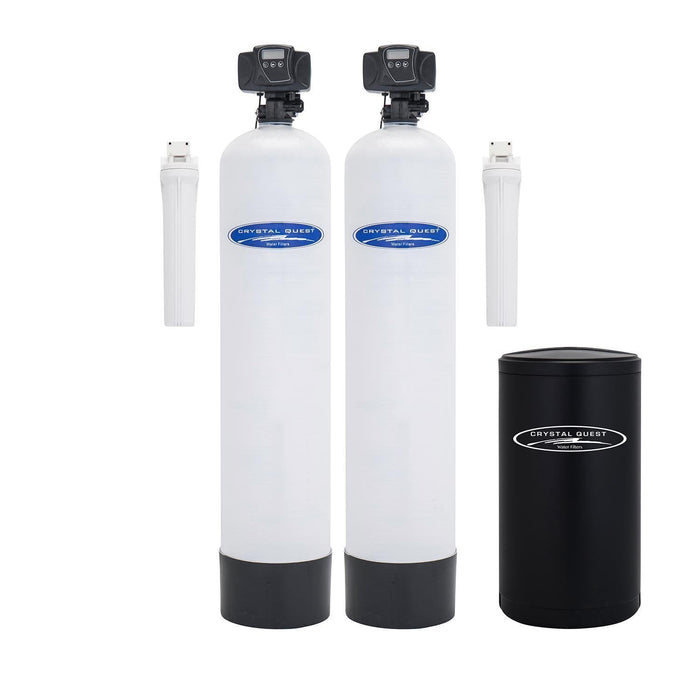
888-963-9454
Mon-Sun: 9am-5pm CST
888-963-9454
Mon-Sun: 9am-5pm CST

✔️ Authorized Crystal Quest Dealer
💰 Lowest Price Online Guaranteed
📦 FREE & FAST Shipping: Delivery in 1-2 weeks
It is a well-known fact that people should drink eight glasses of water a day to help maintain a healthy lifestyle. With a Crystal Quest Smart Whole House Water Filters you get delicious, refreshing, safe, top-quality drinking water.
Crystal Quest Smart Whole House Water Filters are engineered for maximum filtration and maximum performance with minimum maintenance.
Capacity is the amount of water your filter creates clean water for your home. An easier way to think of it is how many bathrooms you have.
Water flows through a 20” sediment cartridge that removes sediment, silt, sand, and dirt.
Water flows through a 20" solid carbon cartridge for removing volatile organic carbon compounds (VOC's), & any remaining insecticides, pesticides and industrial solvents.
Water flows through our SMART Multimedia, which includes 2 types of coconut shell Granulated Activated Carbons (Standard & Catalytic GAC) infused with our Eagle Redox Alloys® 6500 & 9500, and ion exchange resin to reduce contaminants such as heavy metals, i.e. lead & mercury, chlorine, chloramine, & inorganic products such as herbicides, pesticides, petroleum/pharmaceutical by-products and Ceramic and Tourmaline balls to enhance the water and maintain a more alkaline pH.
Homeowners who have hard water normally complain of scale buildup inside pipes, water heaters and appliances and, when hard water reacts with soap, it can form a sticky residue on surfaces. It is important to note that hard water is not a health concern. The only concern with hard water is the deterioration of plumbing, plumbing fixtures and appliances due to scale buildup. Also, the scale buildup inside a water heater will increase the power or gas required to heat the water.
The Traditional Softener
Water is softened by replacing hard ions like magnesium and calcium with softer sodium or potassium ions. This means that the magnesium and calcium ions are actually removed from the water. This is done by an ion exchange resin. Ion exchange happens when the hard water passes through a bed of beads or zeolite, which is a chemical mixture. Water softeners must be regenerated regularly with the use of the brine tank, renewing the medias ability to remove hardness from water. This regeneration is accomplished with a sodium or potassium chloride and water solution which can increase the salt content of your water slightly.
A traditional softener, while removing the calcium and magnesium, will prevent further limescale build up in your appliances and pipes, but will not remove existing buildup. Additionally, the water will have a somewhat slippery or slimy feel.
Maintenance of the traditional softener systems requires refilling the brine solution or backwash solution periodically with the sodium or potassium chloride salt. Potassium chloride is the healthier choice but is more expensive.
The Salt-Free Conditioner
Unlike the traditional softener, the salt-free conditioner does not remove the calcium and magnesium particles. The media in the conditioner changes the calcium so that it cannot leave limescale and becomes harmless to pipes and appliances. Instead of ion exchange, it works on a nano-molecular level. It takes the mineral, under a microscope, it appears as a crystal, and transforms it into a nanoparticle. When minerals are in a nano-particle form, they dissolve in the water and stay there. Also, the typical +2 charge on the molecule is removed which takes away the calcium and magnesium particle’s ability to attach to pipes and appliances, thereby prevention scale buildup. In addition, the conditioner will remove existing buildup in pipes and appliances and apply a protective layer to help prevent additional buildup. Since the conditioner does not require backwashing, no salt product is added to your water and you still have the health benefits of calcium and magnesium minerals.
Important Note:
It is important to understand that if a hardness test is done after using a traditional softener, you will have reduced hardness reading. If a hardness test is done after conditioning, you will have the same hardness reading. This is because, again, the calcium is still in the water after conditioning. It is simply rendered harmless to your plumbing and appliances. If water spotting on dishes is a major concern, you will still have this with the conditioner.
What is hard water? Water described as “hard” is high in dissolved minerals, specifically calcium and magnesium. It is estimated that more than 80% of homes across the country are affected by hard water. What is more staggering, however, is that many homeowners do not know if they have hard water or how to detect it.
The “hardness” of water is determined by the combined number of calcium and magnesium grains present. The higher the number of grains per gallon, the “harder” your water is. These minerals are picked up by “soft” rainwater as it travels down through the soil to the underground water table. Water that comes into contact with limestone (calcium and magnesium rock) has a much higher content of these hard minerals. Hard water has a negative impact on you, your household, and your pocketbook.
You probably have hard water. If left untreated, here is what can happen:
| Home Water Usage | 1-3 Bathrooms | 2-4 Bathrooms |
| Filter Media Volume | 1.5 + cubic feet | 2.0 + cubic feet |
| Capacity (gallons) | 1,000,000 | 1,500,000 |
| Service Flow (GPM) | 9-11 | 10-13 |
| Tank Dimensions | 10" x 54" | 12" x 52" |
| Material | Stainless Steel or Fiberglass | Stainless Steel or Fiberglass |
| Backwash | Automatic | Automatic |
| Brine Tank Dimensions* | 18" x 33" | 18" x 33" |
| Grain Capacity* | 48,000 | 60,000 |
| Product Name | SKU |
|---|---|
| Eaglesorb Water Softeners | CQE-RM-05002 |
| Product Name | SKU |
|---|---|
| Sediment Cartridge (2-7/8"x20") | CQE-RC-04015 |
| Carbon Block Filter Cartridge (2-7/8"x20") | CQE-RC-04014 |